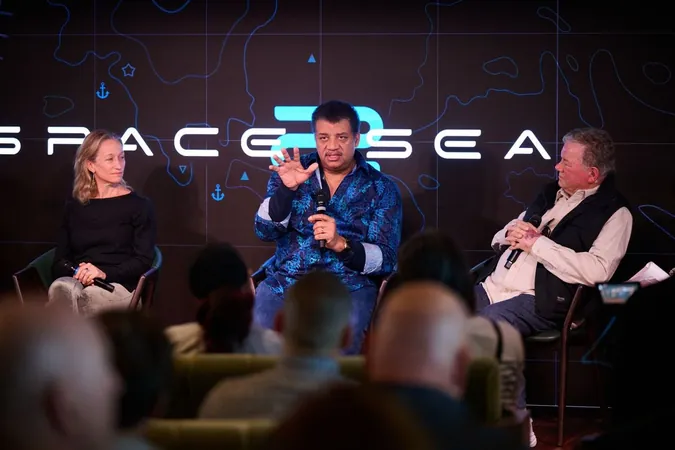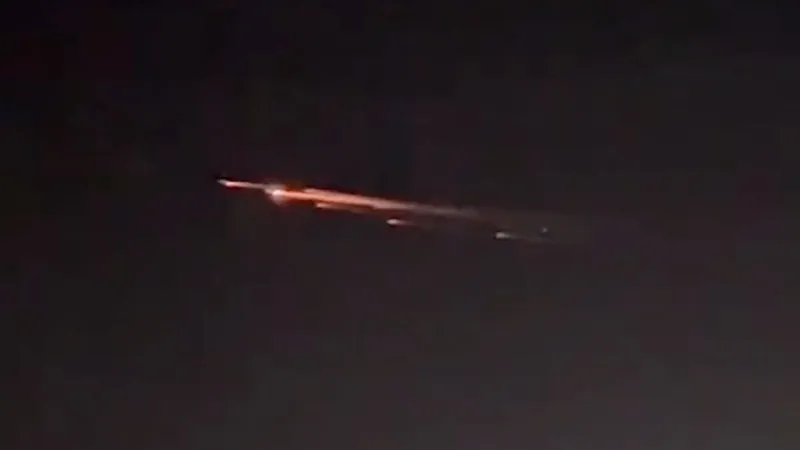
Groundbreaking Panel on Ocean and Space Exploration from Antarctica featuring William Shatner, Neil deGrasse Tyson, and NASA Astronauts
2024-12-22
Author: Sarah
Groundbreaking Panel on Ocean and Space Exploration from Antarctica
In an unprecedented event, the Space2Sea Antarctica expedition kicked off with a remarkable panel discussion aboard a vessel navigating the tumultuous waters of the Drake Passage. This initiative is spearheaded by the organization FUTURE of SPACE (FoS), which aims to inspire curiosity about exploration, whether it be our oceans, outer space, or the wonders right outside our windows.
Astronauts, scientists, and prominent figures including astrophysicist Neil deGrasse Tyson, famed "Star Trek" actor William Shatner, environmental advocate Celine Cousteau, and astronauts Scott Kelly and José Hernández came together to engage with students and young explorers from 46 different countries. The event marked the first-ever live broadcast from the Drake Passage, a feat that highlighted the adventurous spirit of the expedition and FoS's commitment to bridging science and education.
During the lively discussion, moderated by Janet Ivey, the host of PBS's "Janet's Planet," speakers shared personal anecdotes about their journeys into exploration. Tyson recalled discovering his talent for making complex scientific concepts accessible during his eighth-grade math class. This skill has become a cornerstone of his advocacy for science education, stating, "It’s my responsibility to have them understand."
Cousteau also shared her transformative experience of swimming with a humpback whale, expressing the humbling perspective it brought her. "You don’t need to venture far to explore; curiosity can thrive anywhere,” she emphasized, reinforcing the notion that exploration is not confined to extreme environments.
The conversation even turned playful, debating whether it's more challenging to explore the depths of the ocean or to venture into space. Amidst the humor, Kelly addressed the tangible realities of space travel, detailing the physical toll it can take on humans, including unexpected bodily changes during missions. Tyson cheekily remarked, “You’re not being a good ambassador for people to go into space,” highlighting the challenges even astronauts face.
Later that day, a second discussion intensified focus on the scientific and political hurdles of space exploration. Kelly highlighted that the true barriers to reaching Mars often revolve around political support and funding rather than just rocket science. He reflected on the inherent difficulties of abandoning our home planet for Mars, which is significantly less hospitable.
“Despite how difficult it can be to live on Earth, it will always be easier than surviving on Mars,” Kelly noted, yet he maintained optimism about humanity's potential to reach and possibly inhabit other worlds.
In a heartfelt moment, Shatner encouraged students dreaming of space travel to prioritize their education and efforts to succeed. He inspired the youth to let their aspirations guide them toward academic achievement. Hernández added to the sentiment, reminding participants that perseverance is key, stating, "Dreaming big is essential, but you must also back it up with hard work and preparation."
This groundbreaking event successfully merged entertainment with education, illustrating the infinite possibilities of exploration and the importance of nurturing curiosity from an early age. As this new wave of inspiration sweeps across the globe, the hope is that it will ignite a passion for science, technology, engineering, and mathematics among future generations.

 Brasil (PT)
Brasil (PT)
 Canada (EN)
Canada (EN)
 Chile (ES)
Chile (ES)
 España (ES)
España (ES)
 France (FR)
France (FR)
 Hong Kong (EN)
Hong Kong (EN)
 Italia (IT)
Italia (IT)
 日本 (JA)
日本 (JA)
 Magyarország (HU)
Magyarország (HU)
 Norge (NO)
Norge (NO)
 Polska (PL)
Polska (PL)
 Schweiz (DE)
Schweiz (DE)
 Singapore (EN)
Singapore (EN)
 Sverige (SV)
Sverige (SV)
 Suomi (FI)
Suomi (FI)
 Türkiye (TR)
Türkiye (TR)